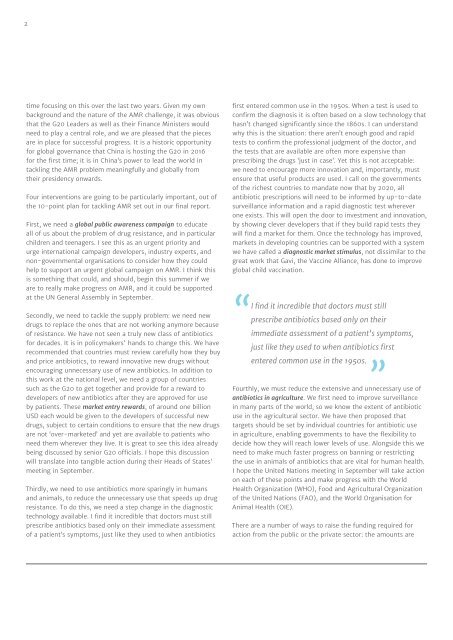TACKLING DRUG-RESISTANT INFECTIONS GLOBALLY FINAL REPORT AND RECOMMENDATIONS
qQvJ300ETXu
qQvJ300ETXu
You also want an ePaper? Increase the reach of your titles
YUMPU automatically turns print PDFs into web optimized ePapers that Google loves.
2<br />
time focusing on this over the last two years. Given my own<br />
background and the nature of the AMR challenge, it was obvious<br />
that the G20 Leaders as well as their Finance Ministers would<br />
need to play a central role, and we are pleased that the pieces<br />
are in place for successful progress. It is a historic opportunity<br />
for global governance that China is hosting the G20 in 2016<br />
for the first time; it is in China’s power to lead the world in<br />
tackling the AMR problem meaningfully and globally from<br />
their presidency onwards.<br />
Four interventions are going to be particularly important, out of<br />
the 10-point plan for tackling AMR set out in our final report.<br />
First, we need a global public awareness campaign to educate<br />
all of us about the problem of drug resistance, and in particular<br />
children and teenagers. I see this as an urgent priority and<br />
urge international campaign developers, industry experts, and<br />
non‐governmental organisations to consider how they could<br />
help to support an urgent global campaign on AMR. I think this<br />
is something that could, and should, begin this summer if we<br />
are to really make progress on AMR, and it could be supported<br />
at the UN General Assembly in September.<br />
Secondly, we need to tackle the supply problem: we need new<br />
drugs to replace the ones that are not working anymore because<br />
of resistance. We have not seen a truly new class of antibiotics<br />
for decades. It is in policymakers' hands to change this. We have<br />
recommended that countries must review carefully how they buy<br />
and price antibiotics, to reward innovative new drugs without<br />
encouraging unnecessary use of new antibiotics. In addition to<br />
this work at the national level, we need a group of countries<br />
such as the G20 to get together and provide for a reward to<br />
developers of new antibiotics after they are approved for use<br />
by patients. These market entry rewards, of around one billion<br />
USD each would be given to the developers of successful new<br />
drugs, subject to certain conditions to ensure that the new drugs<br />
are not ‘over-marketed’ and yet are available to patients who<br />
need them wherever they live. It is great to see this idea already<br />
being discussed by senior G20 officials. I hope this discussion<br />
will translate into tangible action during their Heads of States’<br />
meeting in September.<br />
Thirdly, we need to use antibiotics more sparingly in humans<br />
and animals, to reduce the unnecessary use that speeds up drug<br />
resistance. To do this, we need a step change in the diagnostic<br />
technology available. I find it incredible that doctors must still<br />
prescribe antibiotics based only on their immediate assessment<br />
of a patient’s symptoms, just like they used to when antibiotics<br />
first entered common use in the 1950s. When a test is used to<br />
confirm the diagnosis it is often based on a slow technology that<br />
hasn’t changed significantly since the 1860s. I can understand<br />
why this is the situation: there aren’t enough good and rapid<br />
tests to confirm the professional judgment of the doctor, and<br />
the tests that are available are often more expensive than<br />
prescribing the drugs ‘just in case’. Yet this is not acceptable:<br />
we need to encourage more innovation and, importantly, must<br />
ensure that useful products are used. I call on the governments<br />
of the richest countries to mandate now that by 2020, all<br />
antibiotic prescriptions will need to be informed by up-to-date<br />
surveillance information and a rapid diagnostic test wherever<br />
one exists. This will open the door to investment and innovation,<br />
by showing clever developers that if they build rapid tests they<br />
will find a market for them. Once the technology has improved,<br />
markets in developing countries can be supported with a system<br />
we have called a diagnostic market stimulus, not dissimilar to the<br />
great work that Gavi, the Vaccine Alliance, has done to improve<br />
global child vaccination.<br />
“I find it incredible that doctors must still<br />
prescribe antibiotics based only on their<br />
immediate assessment of a patient’s symptoms,<br />
just like they used to when antibiotics first<br />
entered common use in the 1950s.<br />
”<br />
Fourthly, we must reduce the extensive and unnecessary use of<br />
antibiotics in agriculture. We first need to improve surveillance<br />
in many parts of the world, so we know the extent of antibiotic<br />
use in the agricultural sector. We have then proposed that<br />
targets should be set by individual countries for antibiotic use<br />
in agriculture, enabling governments to have the flexibility to<br />
decide how they will reach lower levels of use. Alongside this we<br />
need to make much faster progress on banning or restricting<br />
the use in animals of antibiotics that are vital for human health.<br />
I hope the United Nations meeting in September will take action<br />
on each of these points and make progress with the World<br />
Health Organization (WHO), Food and Agricultural Organization<br />
of the United Nations (FAO), and the World Organisation for<br />
Animal Health (OIE).<br />
There are a number of ways to raise the funding required for<br />
action from the public or the private sector: the amounts are


